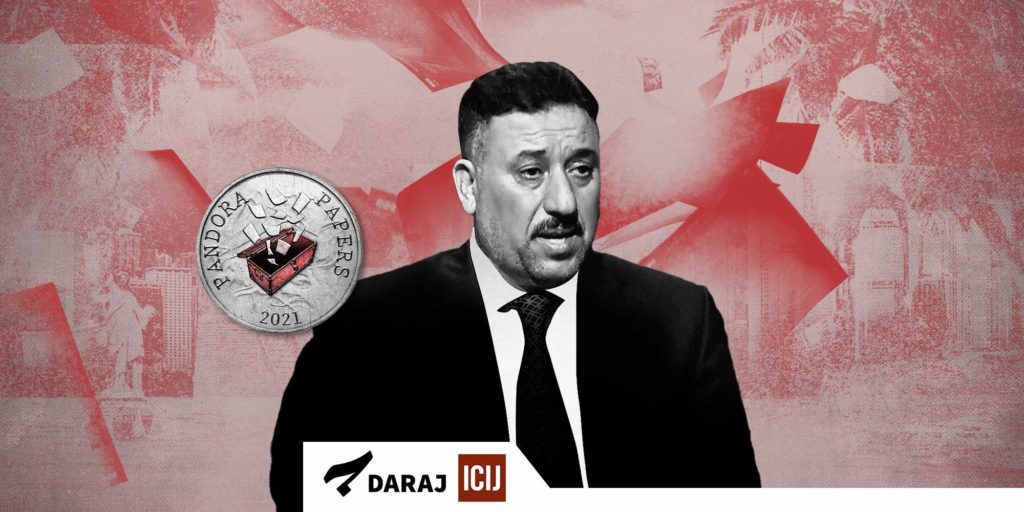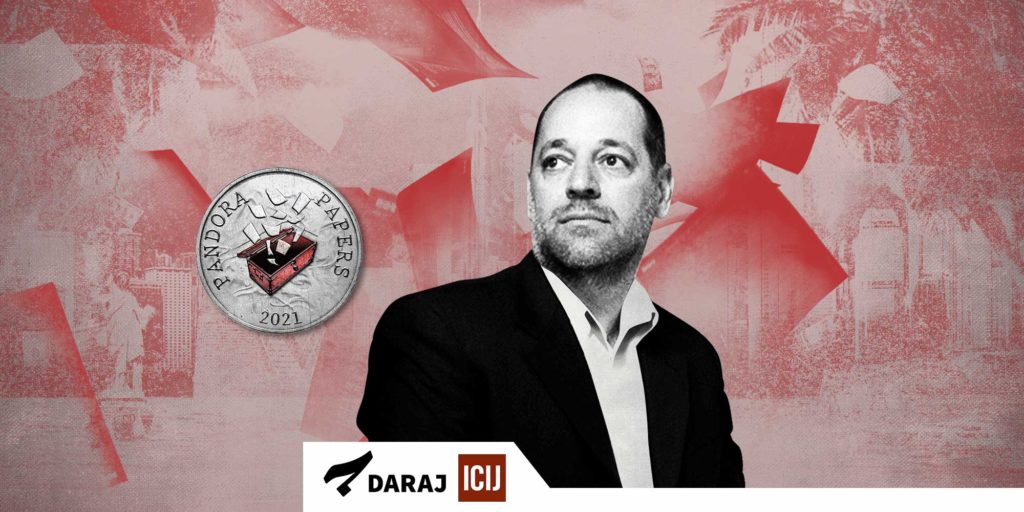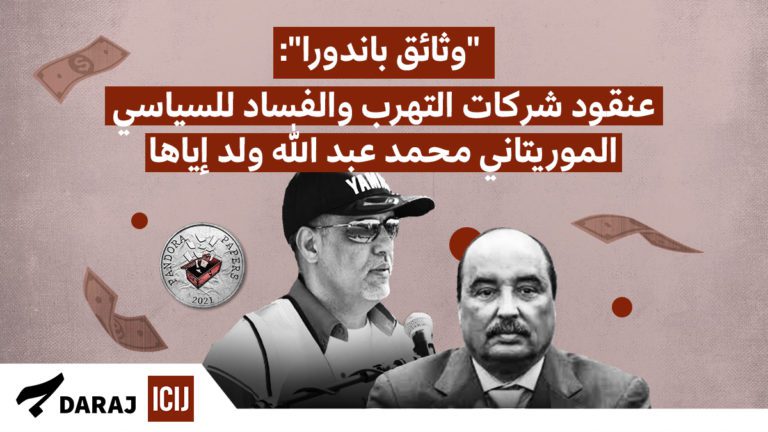On January 23, 2017, as efforts were gathering pace to reach a settlement between the many warring parties in Syrian, the Money Laundering Reporting Officer at the Panama law firm ALEMAN, CORDERO, GALINDO & LEE submitted a report to the Financial Investigation Agency in the British Virgin Islands (BVI).
Earlier that month, on the 11th, he had reported suspicious financial activities concerning three companies registered in the BVI. The three companies are: Libra Investments Trading, Samya Investment Limited and Sunset Real Estate Properties Limited. They are owned by Syrian businessman Samir Hassan, who has been on the European sanctions list since 2011 for economically supporting the Assad regime.
This investigation is based on leaked documents obtained by the International Consortium of Investigative Journalists (ICIJ), which it shared with the Arab Reporters for Investigative Journalism (ARIJ) and a number of other media around the world, as part of the Pandora Papers project, the largest ever cross-border journalism cooperation project.
The millions of leaked documents reveal the assets, secret deals and hidden fortunes of the wealthy, among them more than 130 billionaires, over 30 world leaders and a large number of fugitives, convicts, celebrities and many, many others.
Continuing Despite the Sanctions
The leaked documents reveal that Syrian businessman Samir Hassan continues to operate in the BVI despite being under European sanctions since shortly the outbreak of the Syrian uprising. In 2015, he even established a new company specialized in real estate, one of his main areas of expertise in Syria.
Although the BVI financial authorities knew the owner of the three companies, they were dissolved in September 2017 in violation of European Sanctions Resolution No. 36.
Who is Samir Hassan?
In the wake of the Syrian revolution, the European sanctions list included a number of businessmen close to the Syrian regime, including Samir Hassan, “because of his close working relationship with Maher al-Assad, and because he is known for supporting the Syrian regime economically.”
European sanctions against Hassan were renewed in September 2014. Added to the reasons for his inclusion on the list were his links to the Syrian companies Emaar Group and Al-Sham Holding. Hassan is close to Rami Makhlouf, a cousin of Syrian President Bashar al-Assad,
Al-Sham Holding was launched in 2006 after Rami Makhlouf had announced his plans to launch a company that would bring together 70 investors from among the most prominent Syrian businessmen. Makhlouf became vice-president.
The US Treasury singled out Al-Sham Holding when it issued a list of companies that “support the corrupt reconstruction efforts of the Assad regime.”
Emaar and Al-Sham Holding later merged into Emaar Al-Sham with the aim of developing multi-purpose projects in some of Syria’s most important regions. Last year it was announced that the company is supervising the construction of Marota City, a controversial urban development project on confiscated lands in western Damascus.
Read Also:
According to a 2020 report issued by the Pro-Justice Foundation called Funding War Crimes: Syrian Businessmen Who Kept Assad Going, Hassan manages the finances of several entities close to the Syrian regime, including Makhlouf’s, especially regarding the import of food stuffs.
Another report, issued by the Russian International Affairs Council, indicates that Hassan’s investments in the food industry are “vital for the reconstruction of Syria, as he will be able to provide the materials and products needed to revive the agricultural sector, which is one of the largest contributors to Syrian GDP.”
Although food industries are not targeted by international sanctions, the European resolution confirms that Samir Hassan contributes to the war effort with donations for the benefit of the regime.
One of the reasons for renewing the sanctions against Samir Hassan was the fact that he is the head of the Syrian-Russian Business Council. The report of the Pro Justice Foundation indicates that Hassan also “facilitates the financial transactions for the regime through the Russian Cubit Group, which includes 158 major companies.”
About three months before the European sanctions’ renewal, Hassan’s lawyer attempted to have them lifted. But the European General Court (EGC) rejected his case. This was followed in April 2015 by the BVI Financial Services Commission’s approval of the European sanctions regarding Syria.
However, the Pandora Papers now reveal that Hassan’s companies not only continued to operate in the BVI, but even that he expanded by establishing a new company.
Sunset
One document reveals that Syrian businessman set up real estate business Sunset in November 2015, six months after the BVI approved the European sanctions.
In that same month Hassan resigned as director of the BVI registered firm Libra Investments Trading Limited, although another document shows he still owned 10,000 shares in the company by July 2016.
It also shows that Libra’s other major shareholders, are all registered at the same address as Samir Hassan’s in Damascus.
In both Sunset and Libra Lebanese lawyer Tariq Makkawi obtained power of attorney to conclude contracts and banking transactions on behalf of the companies.
Makkawi is a founder and partner in 7 Lebanese companies. He is on the board of directors of a firm engaged in “negotiating and signing contracts and agreements concerning deals and operations being implemented outside Lebanese territory.”
The firm’s services provided to offshore companies include: “Negotiating, signing contracts, shipping goods and reissuing invoices for operations outside Lebanon or for customs free zones in Lebanon, which includes using the facilities available in the customs free zone in Lebanon to store imported goods for the purpose of re-export.”
“Seeing the increase in US and European sanctions on Syria over the past ten years, Syrian businessmen have exploited Lebanon’s financial secrecy laws and offshore structures to operate front companies,” said Larcia Normanton, head of Alberu Intelligence’s Middle East and North Africa Division.
We tried to contact Tariq Makkawi to find out more about his possible role in facilitating the circumvention of European sanctions, but he did not answer our questions.
Read Also:
Who is Tariq Makkawi?
Tariq is the eldest son of Lebanese politician Jamil Makkawi, one of the founders of the Najada Party. His father served as Minister of Public Works and Transport in 1955 and 1956 and as Minister of Finance from 1957 to 1958.
According to the Lebanon’s Commercial Registry, Tariq Mekkawi is a partner in numerous Lebanese companies.
However, one document leaked in April 2017 clearly indicates that Sunset’s ultimate beneficiary was Samir Hassan. The document stated a declaration by the money-laundering reporting officer in the law firm, saying he had no doubts that Hassan, nor his integrity or reputation, is in line with the standards of the law firm, and if appeared to be a different case, he would report it to the management immediately.
He previously submitted a report in January 2017 to the BVI Financial Investigation Agency about suspicious financial activities by the three companies, including Sunset.
The reason for his report was that the ultimate beneficiary of the three companies (Libra, Samya and Sunset) was Samir Hassan.
Thus, the authorities learnt that the Syrian businessman owns companies in the area under their jurisdiction. More than a year later, in March 2018, the Financial Investigation Agency sent a letter to the law firm that it had completed its investigation into the suspicious financial activities and referred the report to the BVI Financial Services Commission.
However, a document issued by the latter in April 2018 claims that Samir Hassan’s companies were dissolved in September 2017.
This would be a violation of Article 14 of European Union Resolution No. 36 of 2012 regarding restrictive measures on the Syrian regime, which states that “all funds and economic resources belonging to, owned, held or controlled by persons and natural or legal entities included in the Syrian regime must be frozen.”
Annex II and II A
Samir Hassan, ranked 50, is included in the list mentioned in the second appendix. As stated in Paragraph (h) of Article 1 of the European Sanctions Resolution: “Freezing funds means preventing any transfer, modification, use, access or handling of funds in any way that could lead to changes in their size, quantity, location or ownership, possession, character, destination or any other change or modification that would enable the use of the funds, including the management of the investment portfolio.”
Samir Hassan’s companies escaped the guillotine of European sanctions for six years, as he continued to operate in the BVI in peace, despite the suspicious financial activities report submitted to the authorities. The response of the BVI authorities came, but after the suspicious activities were “vanished from the company records.”
Read Also:









